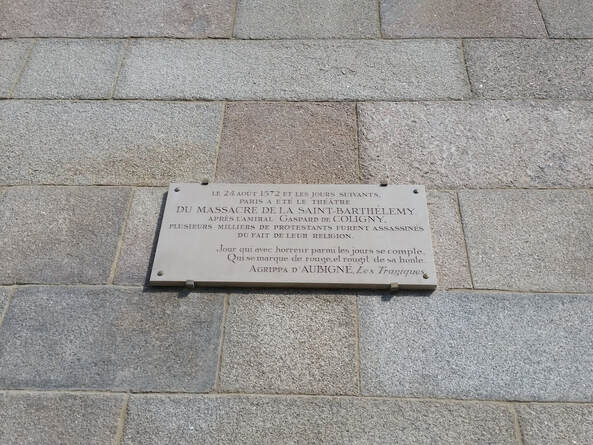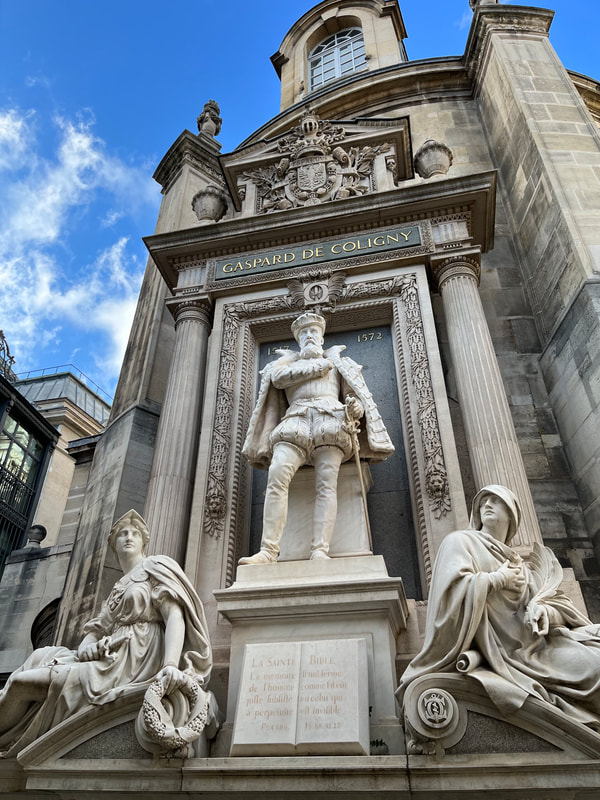Three Days of Massacre: Remembering and Forgetting the St Bartholomew’s Day Massacre, 1572–20227/6/2022 In May 2022 our team attended a three-day conference on the legacy, representations, and uses of the 1572 St Bartholomew’s Day massacre: Cet horrible massacre si renommé par toute l’Europe: Représentations et usages de la Saint Barthelemy en Europe et dans le Monde (1572–2022). Organised by the University of Sorbonne Nouvelle and Sorbonne University, the conference brought together scholars from history and literary studies. On the first day, we met at the Musée Carnavelet, a museum dedicated to the history of Paris, which includes a room on the French Wars of Religion that we had the opportunity to visit. The opening panel discussed the historiography of the St Bartholomew’s Day massacre since the nineteenth century, most notably the influence of Jules Michelet. Closing the panel, Jérémie Foa introduced his recent research on the identification and naming of the perpetrators of the massacre, revealing victims’ attempt to seek justice by denouncing the killers. Speakers of the second panel explored how the massacre has been mobilised, both through fictional works published in the late sixteenth century and in the collective memory of current Protestant communities. Caroline Trotot presented a paper on the memoirs of women who witnessed the massacre and recalled the event later in life, revealing the influence of different generations in creating a narrative of the massacre. The third panel took us outside the borders of early modern France, by discussing how news of the Parisian massacre was received in neighbouring states. Closing the first day, speakers on the fourth panel showed how St Bartholomew’s has been depicted in art and memorialised in the city’s public space. Plaque at the Île de la Cité commemorating the victims of the 1572 St Bartholomew's Day massacre. Photo: Rosanne Baars. The next day, we gathered at the Institut du Monde Anglophone. The opening panel included papers on the political uses of the massacre. Brian Sandberg discussed the concept of massacre and analysed the impact of the Paris bloodbath on the later Wars of Religion. Subsequent papers showed that the massacre was not only used during the wars, but was again mobilised for political purposes in the aftermath of the English Civil Wars of the seventeenth century, as well in the French Republic after the Commune and the Dreyfus affair. Hubert Bost presented a paper in which he analysed how memories of the massacre were mobilised by Huguenot communities in the eighteenth century. He argued that these memories were influenced by the experience of the Huguenots throughout the seventeenth century and were eventually tainted by the Revocation. Given that memories of the early stages of the conflict between Catholics and Protestants evolved with each generation, this raises some interesting questions for our own research project. How were the peace efforts of the late sixteenth century remembered by the second half of the seventeenth century? And did these memories affect the peacebuilding process of the decades leading up to the Revocation? Statue of Gaspard de Coligny, built in the nineteenth century at the Protestant church of the Oratoire du Louvre. Photo: David van der Linden. On the last day of the conference, speakers analysed the construction of memories of the St Bartholomew’s Day massacre in writings, most notably memoirs, historical accounts, and plays, but also by agents of information fabricating narratives of the event in foreign courts. In her paper on the memoirs of the Protestants, Alice Viaud argued that they were used to compensate for the lack of justice provided by the courts and to counter the edicts of pacification imposing silence on the violence of the conflicts. Finally, one of the highlights of the conference was a brilliant performance at the Oratoire du Louvre (by actors from the Studio Asnères) of The Massacre at Paris (1593) by the English playwright Christopher Marlowe. This stimulating conference thus demonstrates that 450 years on, the St. Bartholomew’s Day massacre is still a fruitful topic for historical research. – by Sherilyn Bouyer
0 Comments
Your comment will be posted after it is approved.
Leave a Reply. |
Blog
Welcome to our blog – stay tuned for regular updates on our project. Archives
February 2024
Categories |


 RSS Feed
RSS Feed
